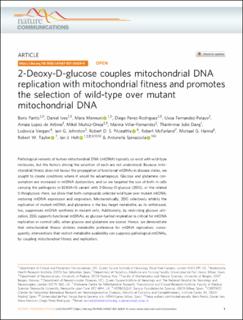2-Deoxy-D-glucose couples mitochondrial DNA replication with mitochondrial fitness and promotes the selection of wild-type over mutant mitochondrial DNA
| dc.contributor.author | Pantic, Boris | |
| dc.contributor.author | Ives, Daniel | |
| dc.contributor.author | Mennuni, Mara | |
| dc.contributor.author | Perez-Rodriguez, Diego | |
| dc.contributor.author | Fernandez-Pelayo, Uxoa | |
| dc.contributor.author | Lopez de Arbina, Amaia | |
| dc.contributor.author | Muñoz-Oreja, Mikel | |
| dc.contributor.author | Villar-Fernandez, Marina | |
| dc.contributor.author | Dang, Thanh-mai Julie | |
| dc.contributor.author | Vergani, Lodovica | |
| dc.contributor.author | Johnston, Iain George | |
| dc.contributor.author | Pitceathly, Robert D. S. | |
| dc.contributor.author | McFarland, Robert | |
| dc.contributor.author | Hanna, Michael G. | |
| dc.contributor.author | Taylor, Robert W. | |
| dc.contributor.author | Holt, Ian J. | |
| dc.contributor.author | Spinazzola, Antonella | |
| dc.date.accessioned | 2022-03-07T09:31:40Z | |
| dc.date.available | 2022-03-07T09:31:40Z | |
| dc.date.created | 2022-01-06T11:20:35Z | |
| dc.date.issued | 2021 | |
| dc.identifier.issn | 2041-1723 | |
| dc.identifier.uri | https://hdl.handle.net/11250/2983332 | |
| dc.description.abstract | Pathological variants of human mitochondrial DNA (mtDNA) typically co-exist with wild-type molecules, but the factors driving the selection of each are not understood. Because mitochondrial fitness does not favour the propagation of functional mtDNAs in disease states, we sought to create conditions where it would be advantageous. Glucose and glutamine consumption are increased in mtDNA dysfunction, and so we targeted the use of both in cells carrying the pathogenic m.3243A>G variant with 2-Deoxy-D-glucose (2DG), or the related 5-thioglucose. Here, we show that both compounds selected wild-type over mutant mtDNA, restoring mtDNA expression and respiration. Mechanistically, 2DG selectively inhibits the replication of mutant mtDNA; and glutamine is the key target metabolite, as its withdrawal, too, suppresses mtDNA synthesis in mutant cells. Additionally, by restricting glucose utilization, 2DG supports functional mtDNAs, as glucose-fuelled respiration is critical for mtDNA replication in control cells, when glucose and glutamine are scarce. Hence, we demonstrate that mitochondrial fitness dictates metabolite preference for mtDNA replication; consequently, interventions that restrict metabolite availability can suppress pathological mtDNAs, by coupling mitochondrial fitness and replication. | en_US |
| dc.language.iso | eng | en_US |
| dc.publisher | Nature Research | en_US |
| dc.rights | Navngivelse 4.0 Internasjonal | * |
| dc.rights.uri | http://creativecommons.org/licenses/by/4.0/deed.no | * |
| dc.title | 2-Deoxy-D-glucose couples mitochondrial DNA replication with mitochondrial fitness and promotes the selection of wild-type over mutant mitochondrial DNA | en_US |
| dc.type | Journal article | en_US |
| dc.type | Peer reviewed | en_US |
| dc.description.version | publishedVersion | en_US |
| dc.rights.holder | Copyright The Author(s) 2021 | en_US |
| dc.source.articlenumber | 6997 | en_US |
| cristin.ispublished | true | |
| cristin.fulltext | original | |
| cristin.qualitycode | 2 | |
| dc.identifier.doi | 10.1038/s41467-021-26829-0 | |
| dc.identifier.cristin | 1975763 | |
| dc.source.journal | Nature Communications | en_US |
| dc.identifier.citation | Nature Communications. 2021, 12, 6997. | en_US |
| dc.source.volume | 12 | en_US |
Tilhørende fil(er)
Denne innførselen finnes i følgende samling(er)
-
Department of Mathematics [968]
-
Registrations from Cristin [10237]

